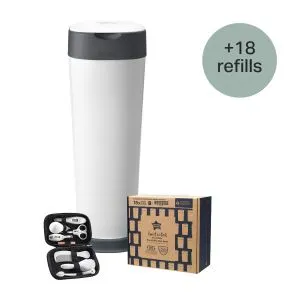
Ultimate XL Nappy Disposal Bundle with 18 Refills
Bundle & Save 40%
Subscription orders can be cancelled at anytime. Free delivery on all subsequent subscription orders. Find out more about subscriptions.
They’re easy and fuss free
Your products are automatically sent to you
You save up to 10% when you sign up for a subscription
You can cancel at any time

Many parents wonder if using a dummy or soother can help alleviate their baby's teething discomfort.
In this post, we'll explore the benefits and potential drawbacks of using dummies to soothe teething pain and offer some alternative comfort measures for you to try.
Every baby experiences teething differently, but there are some common signs of teething that parents can watch for.
It's important to remember that these are just general signs, and each baby's experience may vary.
Teething usually starts around six months old, but every baby is different. Some babies may start teething earlier or later. The first baby teeth to usually appear are the two front teeth on the bottom, followed by the top front teeth.
Explore the Range
When choosing a dummy for your teething baby, consider these factors:
Not all babies will like sucking a dummy, so don't force them to use one. If your baby isn't interested or you prefer not to use a dummy, there are other ways to soothe them when they're teething.
If your baby is in a lot of pain, talk to your GP. They can give you more advice and may suggest a child-friendly pain reliever.
Teething toys can help soothe your baby when they’re teething, but it's important to choose ones that are right for their age and to watch them closely while they're using them.
Studies have shown that using dummies for a long time can harm a child's teeth and can lead to problems like overbite, underbite, and misaligned teeth.
Prolonged soother use after the age of 24 months may interfere with dental development. We recommend stopping soother use entirely when your child is older than 36 months.
The effects of using a dummy can vary depending on individual factors. If you're worried about your child's dental health, it's best to talk to a dentist who will be able to give you professional advice and guidance.
To help your child stop using their dummy, try using it less often, offering other things for comfort, and praising them when they don't use it. Our comprehensive guide has more tips on how to wean them off their dummy.